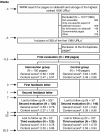Quality of drug information on the World Wide Web and strategies to improve pages with poor information quality. An intervention study on pages about sildenafil
- PMID: 14678344
- PMCID: PMC1884422
- DOI: 10.1046/j.1365-2125.2003.01954.x
Quality of drug information on the World Wide Web and strategies to improve pages with poor information quality. An intervention study on pages about sildenafil
Abstract
Aims: The generally poor quality of health information on the world wide web (WWW) has caused preventable adverse outcomes. Quality management of information on the internet is therefore critical given its widespread use. In order to develop strategies for the safe use of drugs, we scored general and content quality of pages about sildenafil and performed an intervention to improve their quality.
Methods: The internet was searched with Yahoo and AltaVista for pages about sildenafil and 303 pages were included. For assessment of content quality a score based on accuracy and completeness of essential drug information was assigned. For assessment of general quality, four criteria were evaluated and their association with high content quality was determined by multivariate logistic regression analysis. The pages were randomly allocated to either control or intervention group. Evaluation took place before, as well as 7 and 22 weeks after an intervention which consisted of two letters with individualized feedback information on the respective page which were sent electronically to the address mentioned on the page.
Results: Providing references to scientific publications or prescribing information was significantly associated with high content quality (odds ratio: 8.2, 95% CI 3.2, 20.5). The intervention had no influence on general or content quality.
Conclusions: To prevent adverse outcomes caused by misinformation on the WWW individualized feedback to the address mentioned on the page was ineffective. It is currently probably the most straight-forward approach to inform lay persons about indicators of high information quality, i.e. the provision of references.
Figures

Similar articles
-
Parents on the web: risks for quality management of cough in children.Pediatrics. 2000 Jan;105(1):e1. doi: 10.1542/peds.105.1.e1. Pediatrics. 2000. PMID: 10617738
-
The Internet and patient education--resources and their reliability: focus on a select urologic topic.Urology. 1999 Jun;53(6):1117-20. doi: 10.1016/s0090-4295(98)00662-1. Urology. 1999. PMID: 10367838
-
Important drug safety information on the internet: assessing its accuracy and reliability.Drug Saf. 2003;26(7):519-27. doi: 10.2165/00002018-200326070-00005. Drug Saf. 2003. PMID: 12735787
-
Clinical monograph for drug formulary review: erectile dysfunction agents.J Manag Care Pharm. 2005 Mar;11(2):151-71. doi: 10.18553/jmcp.2005.11.2.151. J Manag Care Pharm. 2005. PMID: 15766322 Free PMC article. Review.
-
[Sildenafil (Viagra). Tolerance, contraindications, drug interactions].Urologe A. 1999 Mar;38(2):124-7. doi: 10.1007/s001200050254. Urologe A. 1999. PMID: 10231931 Review. German.
Cited by
-
The internet as a tool in clinical pharmacology.Br J Clin Pharmacol. 2006 Jun;61(6):787-90. doi: 10.1111/j.1365-2125.2006.02682.x. Br J Clin Pharmacol. 2006. PMID: 16722847 Free PMC article. Review.
-
[Assessment of websites with information on medicines].Aten Primaria. 2009 Jul;41(7):360-6. doi: 10.1016/j.aprim.2008.10.009. Epub 2009 May 22. Aten Primaria. 2009. PMID: 19464077 Free PMC article. Spanish.
-
Drug safety information through the internet: the experience of an Italian website.Drug Saf. 2009;32(3):245-53. doi: 10.2165/00002018-200932030-00007. Drug Saf. 2009. PMID: 19338382
-
Quality and Readability of Web-Based Information for Patients With Pancreatic Cysts: DISCERN and Readability Test Analysis.JMIR Cancer. 2021 Mar 16;7(1):e25602. doi: 10.2196/25602. JMIR Cancer. 2021. PMID: 33724203 Free PMC article.
-
Analysis of the quality of meningioma education resources available on the Internet.Neurooncol Pract. 2020 Nov 30;8(2):129-136. doi: 10.1093/nop/npaa082. eCollection 2021 Apr. Neurooncol Pract. 2020. PMID: 35112670 Free PMC article.
References
-
- Spadaro R The European Opinion Research Group (EORG) 2003. [May 24 2003]. Eurobarometer 58.0. European Union, citizens and sources of information about health, March Available from: URL http://europaeu.International/comm/health/ph_information/documents/EB_58....
-
- Gordon MM, Capell HA, Madhok R. The use of the Internet as a resource for health information among patients attending a rheumatology clinic. Rheumatology. 2002;41:1402–1405. - PubMed
-
- Baker L, Wagner TH, Singer S, Bundorf MK. Use of the internet and E-mail: for health care information: Results from a national survey. JAMA. 2003;289:2400–2406. - PubMed
-
- Pew Internet and American Life Project. 2000. [May 24 2003]. The online health care revolution: How the Web helps Americans take better care of themselves November 26. Available from: URL http://www.pewinternet.org/reports/pdfs/PIP_Health_Report.pdf.
-
- Eysenbach G, Powell J, Kuss O, Sa ER. Empirical studies assessing the quality of health information for consumers on the world wide web: a systematic review. JAMA. 2002;287:2691–2700. - PubMed
Publication types
MeSH terms
Substances
LinkOut - more resources
Full Text Sources

